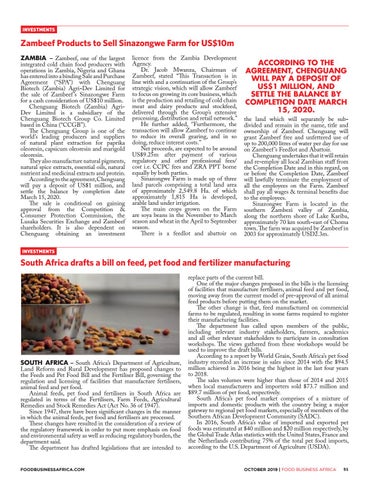INVESTMENTS
Zambeef Products to Sell Sinazongwe Farm for US$10m ZAMBIA – Zambeef, one of the largest integrated cold chain food producers with operations in Zambia, Nigeria and Ghana has entered into a binding Sale and Purchase Agreement (“SPA”) with Chenguang Biotech (Zambia) Agri-Dev Limited for the sale of Zambeef ’s Sinazongwe Farm for a cash consideration of US$10 million. Chenguang Biotech (Zambia) AgriDev Limited is a subsidiary of the Chenguang Biotech Group Co. Limited based in China (“CCGB”). The Chenguang Group is one of the world’s leading producers and suppliers of natural plant extraction for paprika oleoresin, capsicum oleoresin and marigold oleoresin. They also manufacture natural pigments, natural spice extracts, essential oils, natural nutrient and medicinal extracts and protein. According to the agreement, Chenguang will pay a deposit of US$1 million, and settle the balance by completion date March 15, 2020. The sale is conditional on gaining approval from the Competition & Consumer Protection Commission, the Lusaka Securities Exchange and Zambeef shareholders. It is also dependent on Chenguang obtaining an investment
licence from the Zambia Development Agency. Dr. Jacob Mwanza, Chairman of Zambeef, stated “This Transaction is in line with and a continuation of the Group’s strategic vision, which will allow Zambeef to focus on growing its core business, which is the production and retailing of cold chain meat and dairy products and stockfeed, delivered through the Group’s extensive processing, distribution and retail network.’’ He further added, ‘’Furthermore, the transaction will allow Zambeef to continue to reduce its overall gearing, and in so doing, reduce interest costs.’’ Net proceeds, are expected to be around US$9.25m after payment of various regulatory and other professional fees/ cost i.e. CCPC fees and ZRA PPT borne equally by both parties. Sinazongwe Farm is made up of three land parcels comprising a total land area of approximately 2,549.8 Ha. of which approximately 1,815 Ha is developed, arable land under irrigation. The main crops grown on the Farm are soya beans in the November to March season and wheat in the April to September season. There is a feedlot and abattoir on
ACCORDING TO THE AGREEMENT, CHENGUANG WILL PAY A DEPOSIT OF US$1 MILLION, AND SETTLE THE BALANCE BY COMPLETION DATE MARCH 15, 2020. the land which will separately be subdivided and remain in the name, title and ownership of Zambeef. Chenguang will grant Zambeef free and unfettered use of up to 200,000 litres of water per day for use on Zambeef ’s Feedlot and Abattoir. Chenguang undertakes that it will retain and re-employ all local Zambian staff from the Completion Date and in this regard, on or before the Completion Date, Zambeef will lawfully terminate the employment of all the employees on the Farm. Zambeef shall pay all wages & terminal benefits due to the employees. Sinazongwe Farm is located in the southern Zambezi valley of Zambia, along the northern shore of Lake Kariba, approximately 70 km south-east of Choma town. The farm was acquired by Zambeef in 2003 for approximately USD2.3m.
INVESTMENTS
South Africa drafts a bill on feed, pet food and fertilizer manufacturing
SOUTH AFRICA – South Africa’s Department of Agriculture, Land Reform and Rural Development has proposed changes to the Feeds and Pet Food Bill and the Fertiliser Bill, governing the regulation and licensing of facilities that manufacture fertilisers, animal feed and pet food. Animal feeds, pet food and fertilisers in South Africa are regulated in terms of the Fertilisers, Farm Feeds, Agricultural Remedies and Stock Remedies Act (Act No. 36 of 1947). Since 1947, there have been significant changes in the manner in which the animal feeds, pet food and fertilisers are processed. These changes have resulted in the consideration of a review of the regulatory framework in order to put more emphasis on food and environmental safety as well as reducing regulatory burden, the department said. The department has drafted legislations that are intended to FOODBUSINESSAFRICA.COM
replace parts of the current bill. One of the major changes proposed in the bills is the licensing of facilities that manufacture fertilisers, animal feed and pet food, moving away from the current model of pre-approval of all animal feed products before putting them on the market. The other change is that, feed manufactured on commercial farms to be regulated, resulting in some farms required to register their manufacturing facilities. The department has called upon members of the public, including relevant industry stakeholders, farmers, academics and all other relevant stakeholders to participate in consultation workshops. The views gathered from these workshops would be used to improve the draft bills. According to a report by World Grain, South Africa’s pet food industry recorded an increase in sales since 2014 with the $94.5 million achieved in 2016 being the highest in the last four years to 2018. The sales volumes were higher than those of 2014 and 2015 when local manufacturers and importers sold $73.7 million and $89.7 million of pet food, respectively. South Africa’s pet food market comprises of a mixture of imports and domestic products with the country being a major gateway to regional pet food markets, especially of members of the Southern African Development Community (SADC). In 2016, South Africa’s value of imported and exported pet foods was estimated at $40 million and $20 million respectively, by the Global Trade Atlas statistics with the United States, France and the Netherlands contributing 75% of the total pet food imports, according to the U.S. Department of Agriculture (USDA). OCTOBER 2019 | FOOD BUSINESS AFRICA
51
